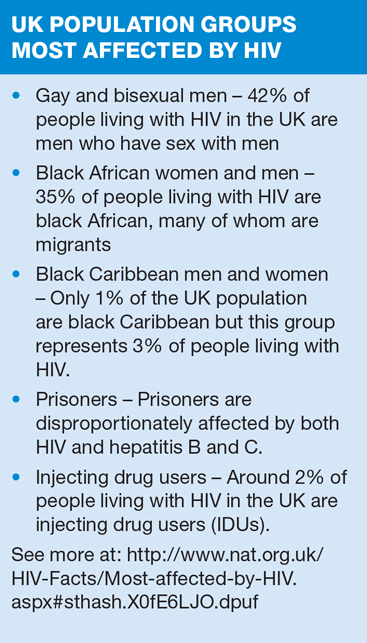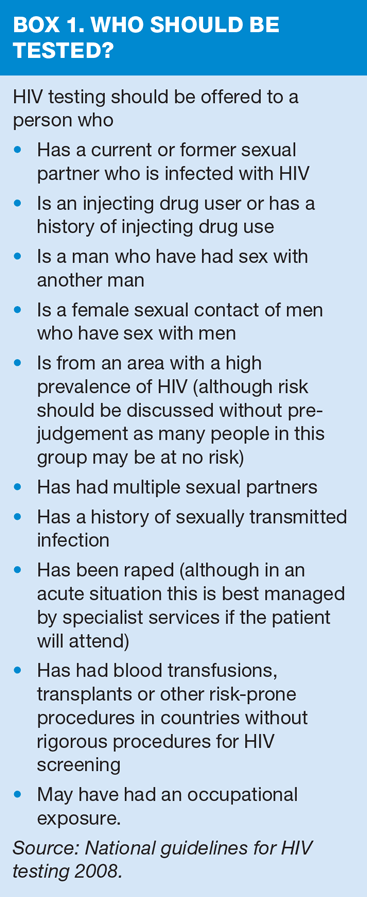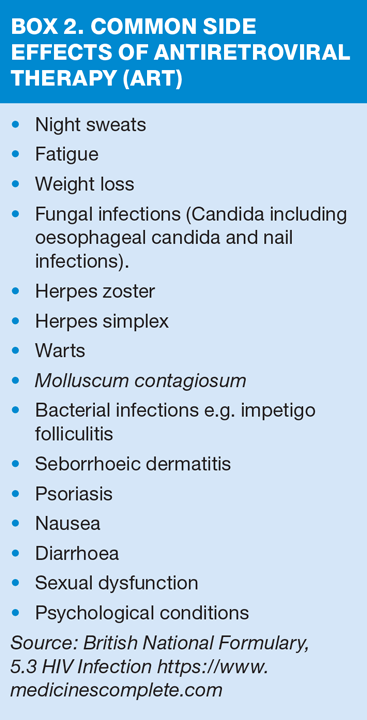Living with HIV: The role of the practice nurse
Marie Therese Massey
Marie Therese Massey
MEdPGDip Medical Education, BMed Sci (GPN), RSCN, RGN
Specialist Practice Nurse Sexual Health, Senior Lecturer, Sheffield
Once perceived as a death sentence, a diagnosis of HIV is now more likely to mean a near-normal lifespan, and increasingly, HIV should be considered a long-term condition like any other – and as such, well within the scope of most practice nurses
The development of successful antiretroviral therapy (ART) means people with HIV, who are diagnosed early and motivated to take their therapy, can expect a near normal life expectancy. Research in the Lancet in 2008 showed that a patient diagnosed today at age 20 can expect to live to nearly 70.1 According to the most recent figures from Public Health England, there were an estimated 98,400 people in 2012 living with HIV in the UK. Of these, 22% are unaware of their HIV infection. The overall prevalence of HIV is 1.5 per 1000 population. While some groups have a higher proportion of people living with HIV than others (Box 1) all areas of our society are affected, including the older person and more than 900 children under 15.2
With the increase in life expectancy, a new set of HIV-associated complications has emerged, resulting in a novel chronic disease that, for many people, will span several decades of life. Primary care is in an ideal position not only to support the drive for the early diagnosis of HIV, but also to support specialist services for HIV in successful long-term management, in the same way as diabetes or COPD. Consequently practice nurses will play a key role in facilitating a collaborative approach towards management, and particularly in helping patients to navigate their way through the various specialties and agencies involved in their care.
HIV TESTING AND DIAGNOSIS
Late diagnosis is the most important factor associated with HIV-related morbidity and mortality: consequently, all providers of healthcare should strive to increase the uptake of HIV testing, in line with the UK Guidelines for HIV testing 2008.3 All GPs should routinely offer and recommend diagnostic HIV testing to patients, especially to those with associated risk factors. While testing for HIV is increasing in the general practice setting, there are still a number of reasons why it is not carried out. For example, practitioners may:
- Underestimate the risk of HIV in their patients
- Fail to recognise HIV as a modifiable prognostic indicator
- Have misconceptions about the need for detailed pre-test counselling
- Misunderstand the implications for insurance
- Have anxieties about false positives
WHEN TO TEST
There are a number of circumstances in which it is appropriate to conduct an HIV test in primary care:
- Patient request
- Opportunistic testing – when an HIV test is offered to someone who might be at risk (Box 1)
- Diagnostic testing – when an HIV test is done because someone has an indicator condition, or symptoms or signs of HIV infection
- Screening – for example antenatal screening, or routine offering of the test to someone who has had a diagnosis of an STI.
If the test is offered on a routine or opt-out basis, evidence suggests it makes offering the test easier as it is perceived as non-judgmental and it is more likely to be accepted and carrying out the test provides an good opportunity to offer safe sex messages.4,5 Any competent healthcare professional can offer testing for HIV. Considerations should include:
- Pre-test discussion
- Benefits of testing
- Obtaining informed consent
- How results will be given
- Issues raised by patient
- Optional use of written leaflets
- Written consent unnecessary
THE ROLE OF THE PRACTICE NURSE
A positive HIV result remains a devastating diagnosis for an individual, and patients learning to live with their condition face particular and significant challenges, including stigma,6 which need to be dealt with in a sensitive manner. Therefore a strong nurse-patient relationship is crucial. There is a need to acknowledge and reassure patients on how confidentiality and continuity of care will be maintained. Caring for an individual with HIV should be comparable to looking after those with other chronic conditions.
The responsibility for initiating and monitoring ART remains with the specialist centres that prescribe it. There have been a number of models of managing HIV in general practice including enhanced services, GPs working in HIV clinics and outreach specialist services in the community setting.7 However, for most of us, when dealing with the health problems of our HIV-positive patients, all that is required is advice, reassurance or simple treatment. However there will be times when immediate referral back to specialist services may be appropriate.
HEALTH PROMOTION, SCREENING AND IMMUNISATION
As with any other chronic disease, measures to maximise health are important, but historically general practice has not played a major role in the care of people with HIV in the UK. Nevertheless there are a number of benefits for patients to being managed in primary care, not least that patients find it easier to attend clinics near to their home. General practice also has particular strengths in areas that are becoming important for those living with HIV, such as blood pressure and lipid management, monitoring of renal function and treatment of mental health problems.7
Treatment for HIV does not fully restore immune health; as a result, several inflammation-associated or immunodeficiency complications are common for those living with HIV. These include:
- Cardiovascular disease,
- Cancers (including anal cancers, Kaposi’s sarcoma, non-Hodgkin’s lymphoma and carcinoma of the cervix)
- Liver disease
- Kidney disease
- Osteoporosis
- Neurocognitive disorders
- Depression
Cardiovascular disease prevention
Research indicates that people with HIV are at higher risk from dyslipidemia and cardiovascular disease. In addition, patients are susceptible to type 2 diabetes through insulin resistance associated with anti-retroviral therapy (ART), which is compounded if the patient is overweight. Consequently health promotion messages should include promoting healthy eating, regular physical activity, safe alcohol use and smoking cessation advice along with regular blood pressure and blood sugar checks and regular serum creatinine and proteinuria monitoring.4
Immunisation
The practice can and should play a key role in immunising patients who have HIV. Individuals with HIV infection should not normally receive BCG, cholera, or oral typhoid. Live oral polio (Sabin) immunisation should not be given due to the small risk of contact with excreted live vaccine.
All inactivated immunisations such as pertussis, diphtheria, tetanus, inactivated polio (Salk), typhoid, and meningitis C are safe.
Adults with HIV should be offered:
- Influenza immunisation each year
- Hepatitis B testing and immunisation as appropriate
- Hepatitis A immunisation for men who have sex with men
- Pneumococcal vaccination
Specialist advice should be obtained from the local Genito Urinary Medicine clinic (GUM) where appropriate, and specialist advice should be sought from the paediatric team about immunisation of children who are themselves infected with HIV, and children of parents with HIV.7,8
Sexual health advice
Practice nurses need to be able to discuss sexual practices with their patients living with HIV in a way that is supportive and avoids criticism, especially in individuals who find it difficult to maintain safe sexual practices. Where possible offer condoms and lubricant or ensure patients are aware of the services locally that offer a free and regular supply. Patients may seek advice around disclosure of HIV status to a partner or family, and this may require referral to an expert counsellor – particularly if the patient has concerns around onward transmission and the possibility (although unlikely) of criminal prosecution.9 Most GUM clinics will provide a specialist counselling service for clients with HIV.
For those individuals not in monogamous relationships then sexually transmitted infection (STI) screening including hepatitis B and C should be offered on a regular basis and after any risk taking behaviour. The presence of (STIs) has a dramatic effect on HIV transmission as the presence of an STI will increase the shedding of the virus, so continued condom use is strongly recommended.9 It is helpful to make sure the patient with HIV is aware of the availability of post exposure prophylaxis (PEPSE) following sexual exposure.10
Cervical screening
Women with HIV are more at risk from human papilloma virus (HPV)-related disease, including cervical cancer and genital warts. All women with HIV infection should have annual smears with more frequent follow-up and colposcopy if abnormalities are found.4
Contraception
Contraceptive choice for HIV-infected women may be limited by interactions with ART as the most commonly used ART combinations include enzyme inducing drugs. Consequently there is reduced efficacy in the combined oral contraceptive (COC), progestogen-only pill (POP) and hormonal patches. Implants are also potentially affected by interactions with enzyme-inducing HIV medications so finding an alternative method is advisable. However, the efficacy of the IUD, the IUS or depot medroxyprogesterone acetate injections does not appear to be affected by enzyme-inducing drugs although studies are ongoing. Consequently condoms remain a useful additional precaution against pregnancy where the efficacy of the contraceptive used may be reduced, and they remain the only method proven to reduce the risk of HIV transmission.11
Emergency contraception
The copper IUD is the most effective method and will not be affected by drug interactions. Doubling the dose of levonorgestrel (Levonelle) is generally advised for women on medication that interacts with progestogens, although this is unlicensed. If in doubt about which ART your patient is taking then the double dose is advised. Doubling the dose of ulipristal acetate (ellaOne) is not advised.
Ulipristal acetate should not be used by women using enzyme-inducing drugs or who have stopped them within the last four weeks.11 Again if appropriate refer for specialist advice.
Mental health
Mental health problems are more common in people with HIV than in the general population.12 Some antiretroviral drugs may be associated with psychiatric disturbance, or the person may feel guilt around engaging with high risk sexual activity in the past. Coupled with this, people diagnosed with HIV continue to face stigma, isolation and discrimination, all of which may make them more likely to become depressed or anxious.12 Stress, depression and bipolar disorder may be seen more commonly in people with HIV. NICE recommends that any patient who may have depression, especially those with a past history of depression or who suffer from a chronic physical illness, should be screened for depression in primary care at least annually. Management of mental health problems is as normal in general practice, with the proviso that prescribed medications need to be checked for interactions with ART.13 Referral for supportive counselling and/or specialist or psychological support may also be necessary.
Travel advice and immunisation
Hepatitis A and B vaccination should be offered as appropriate. If a patient has had a Hep B course then titres should be checked before travel. Malaria prophylaxis is used, but interactions with ART can occur.13 Check www.hiv-druginteractions.org or BHIVA guidelines for more detailed information. Some countries restrict entry for those with HIV, so patients should check with the relevant embassy before travel. See www.aidsmap.com.
SIDE EFFECTS OF ART
Practice nurses need to be aware that, although the benefits of antiretroviral therapy have been enormous for people diagnosed with HIV, these drugs are associated with a significant number of side effects, some of which are serious.13 Again many side effects will be managed by the specialist services but it is worthwhile having some knowledge in the event of a patient seeking advice. Some common side effects are listed in Box 2. While some of these effects, such as candidiasis or herpes simplex, may respond to conventional treatments they may be indicators of poor compliance with ART therapy, or be indicative of an underlying condition, so must be approached with caution. Management should always be discussed with a specialist clinician before action is taken.
SUMMARY
The Standards for HIV clinical care14 recommend that ‘every patient with HIV infection must be strongly encouraged to register with a GP and involve him or her in their care’. Consequently practice nurses need to be equipped with the knowledge and skills to offer support and advice to clients with HIV in the same way they would for any other patient. However, HIV remains a complex and often challenging condition that continues to need the specialist clinical care provided by hospital based services.
This article has not tried to cover the whole spectrum of caring for those with HIV including the complex drug interactions with ART or the continuing emotional and psychological issues of living with HIV. Instead it has tried to address some of the common areas on which practice nurses would expect to offer advice. However specialist advice is always available and should be sought when in doubt. Comprehensive guidelines for managing patients with HIV in Primary Care can be found in the document HIV in Primary Care – MedFASH4 at www.medfash.org.uk.
REFERENCE
1. Terence Higgins Trust. Living with HIV long term www.tht.org.uk
2. Public Health England. HIV in the United Kingdom: 2013 Report. Public Health England. London.
3. British HIV Association, British Association of Sexual Health and HIV, British Infection Society (BHIVA, BASHH, BIS). UK National guidelines for HIV testing 2008. British HIV Association.
4. HIV in Primary Care - MedFASH www.medfash.org.uk
5. NAM (formerly National AIDS Manual). www.aidsmap.com
6. British HIV Association (BHIVA) Briefing paper on extending the role of primary and community care in HIV. http://www.bhiva.org/PrimaryCommunityCare.aspx
7. BHIVA. Guidelines for the immunization of HIV-infected adults, 2008 http://www.bhiva.org/Immunization2008.aspx
8. Public Health England Immunisation against infectious diseases https://www.gov.uk/government/collections/immunisation-against-infectious-disease-the-green-book
9. BASHH/BHIVA/FSRH. UK guidelines for the management of sexual and reproductive health of people living with HIV infection, 2008. http://www.bhiva.org/UKGuidelines2008.aspx
10. BASHH. UK Guideline for the use of post exposure prophylaxis for HIV following sexual exposure, 2006. http://www.bashh.org/documents/4076.pdf
11. Faculty of Sexual and Reproductive Healthcare UK Medical Eligibility Criteria for Contraceptive Use, 2009 www.fsrh.org
12. American Psychiatric Association. HIV and AIDS. www.psychiatry.org/hiv-and-aids
13. BHIVA. Standards of care for people living with HIV, 2013 http://www.bhiva.org/documents/Standards-of-care/BHIVAStandardsA4.pdf
14. University of Liverpool. HIV Drug Interactions. www.hiv-druginteractions.org
Related articles
View all Articles


